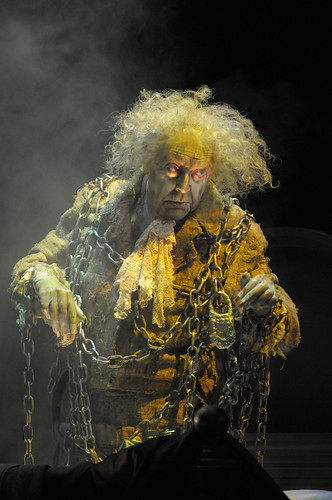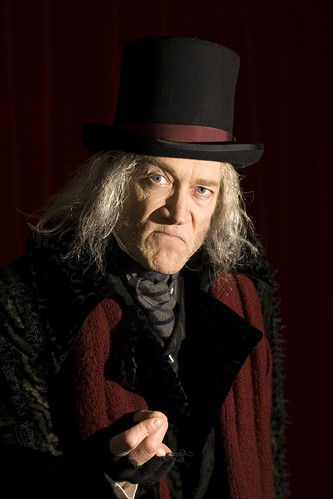
James Carpenter (center) is Scrooge in American Conservatory Theater’s annual production of A Christmas Carol. Photo by Kevin Berne
American Conservatory Theater’s annual production of A Christmas Carol is in full swing in downtown San Francisco. Rather than reviewing this holiday perennial, let’s just hit some of the major points. Herewith, in descending order, some reasons to see the show. (To read the complete list, visit my theater page here.)
10. Before and after the show you get to wander around the festive Union Square area, which, despite the general mood of the nation, is rich with decoration and holiday cheer. The ice rink in Union Square, just under the enormous, beautifully decorated tree, is especially nice.
9. The special effects, especially where the ghosts are concerned, are marvelous. The first appearance by Jacob Marley’s ghost is a doozy, and the giant Ghost of Christmas Future is creepy in all the right ways (young audience members should probably be at least 4 years old to see this show).
8. During the Fezziwig’s ball, choreographer Val Caniparoli goes to town with the joyous dancing. His moves for the children are especially charming.
 7. Speaking of children, the youngest members of the cast are wonderful. Their enthusiasm is contagious. Noah Pawl Silverman St. John is a notable Boy Scrooge, and Lauren Safier is a whirlwind of affection as his sister, Little Fan.
7. Speaking of children, the youngest members of the cast are wonderful. Their enthusiasm is contagious. Noah Pawl Silverman St. John is a notable Boy Scrooge, and Lauren Safier is a whirlwind of affection as his sister, Little Fan.
6. The not-so-enjoyable aspects of the production (the sketchy set, the wan music) are trumped by the better aspects of the show and by the story itself. That Charles Dickens knew a thing or two about entertaining while moralizing.
5. Nicholas Pelczar adds a welcome jolt of real holiday feeling as Scrooge’s nephew, Fred. His unfurling of a red scarf as a gift for old Ebenezer is one of the show’s simplest yet most enduring images.
4. The costumes by Beaver Bauer are gorgeous and funny (see No. 3). The colors, textures and patterns swirl around the stage like a confectioner’s dream.
3. The dancing Spanish Onions (Isabella Ateshian and Ella Ruth Francis), Turkish Figs (Rachel Share-Sapolsky and Kira Yaffe) and French Plums (Megan Apple and Megumi Nakamura) bring a whole lot of charm to the Ghost of Christmas Present’s dissertation on abundance.
2. Some great Bay Area actors sink their considerable chops into delicious supporting roles. Ken Ruta as the ghost of Jacob Marley is a delight, as is Sharon Lockwood as Scrooge’s char woman, Mrs. Dilber, and as the festive Mrs. Fezziwig. Jarion Monroe, in a curly red wig, is adorable as Mr. Fezziwig, and Cindy Goldfield and Stephen Barker Turner are warm and fuzzy as the Cratchits, impoverished only in economic terms.
1. James Carpenter’s performance as Scrooge is reason enough to see this production. He’s a brilliant actor and breathes life into this chestnut of a character. The production surrounding him isn’t always up to his level, but he lifts the entire experience to an appropriately Dickensian level.
You can also read my review of ACT’s A Christmas Carol in the San Francisco Chronicle here.
FOR MORE INFORMATION:
A Christmas Carol continues through Dec. 27 at the American Conservatory Theater, 415 Geary St., San Francisco. Tickets are $18-$102. Call 415-479-2ACT or visit www.act-sf.org
Photo at right: Ken Ruta is the Ghost of Jacob Marley in ACT’s A Christmas Carol. Photo by Kevin Berne

 Carpenter, 56, one of the Bay Area’s most revered actors, is now in his third year as Scrooge in American Conservatory Theater’s re-tooled production of A Christmas Carol, and he’s as passionate as ever about the role and the production.
Carpenter, 56, one of the Bay Area’s most revered actors, is now in his third year as Scrooge in American Conservatory Theater’s re-tooled production of A Christmas Carol, and he’s as passionate as ever about the role and the production.

 Greatest guilty pleasure: Legally Blonde, The Musical, had its pre-Broadway run early in 2007 at San Francisco’s Golden Gate Theatre, and though it had its problems, it was a heck of a lot of fun. The best number was the lengthy “What You Want” in which sorority gal Elle Woods (Laura Bell Bundy) decides to apply to Harvard. In true musical fashion, the number sweeps through time and space, coursing through months of effort and from Southern California to the hallowed halls of Harvard. Jerry Mitchell’s choreography incorporates a frat party, the Harvard selection committee and a marching band.
Greatest guilty pleasure: Legally Blonde, The Musical, had its pre-Broadway run early in 2007 at San Francisco’s Golden Gate Theatre, and though it had its problems, it was a heck of a lot of fun. The best number was the lengthy “What You Want” in which sorority gal Elle Woods (Laura Bell Bundy) decides to apply to Harvard. In true musical fashion, the number sweeps through time and space, coursing through months of effort and from Southern California to the hallowed halls of Harvard. Jerry Mitchell’s choreography incorporates a frat party, the Harvard selection committee and a marching band. Speaking of MacDougall: It was a good year for the actress (seen at right with the fur and tiara), who died memorably in Cal Shakes’ King Lear and ended 2007 with a superb, hip-swiveling, lip-pursing performance in Sex by Mae West at the Aurora.
Speaking of MacDougall: It was a good year for the actress (seen at right with the fur and tiara), who died memorably in Cal Shakes’ King Lear and ended 2007 with a superb, hip-swiveling, lip-pursing performance in Sex by Mae West at the Aurora. Best ensemble: Behind every good show is a good ensemble, in front of and behind the scenes. But the one that comes to mind that, together, elevated the play was the fine crew in TheatreWorks’ Theophilus North (left) directed by Leslie Martinson.
Best ensemble: Behind every good show is a good ensemble, in front of and behind the scenes. But the one that comes to mind that, together, elevated the play was the fine crew in TheatreWorks’ Theophilus North (left) directed by Leslie Martinson. Favorite quote of the year: It was uttered by the food critic Anton Ego (and written by Brad Bird) in the brilliant Pixar/Disney movie Ratatouille. As a critic (or what’s left of one), the words really hit home. And they’re true.
Favorite quote of the year: It was uttered by the food critic Anton Ego (and written by Brad Bird) in the brilliant Pixar/Disney movie Ratatouille. As a critic (or what’s left of one), the words really hit home. And they’re true.


 Though he has never performed in a Dickens stage adaptation _ somehow he escaped the perennial call of A Christmas Carol _ Eisenberg says he’s a Dickens fan _ especially of David Lean’s film adaptations: Oliver Twist and Great Expectations.
Though he has never performed in a Dickens stage adaptation _ somehow he escaped the perennial call of A Christmas Carol _ Eisenberg says he’s a Dickens fan _ especially of David Lean’s film adaptations: Oliver Twist and Great Expectations.